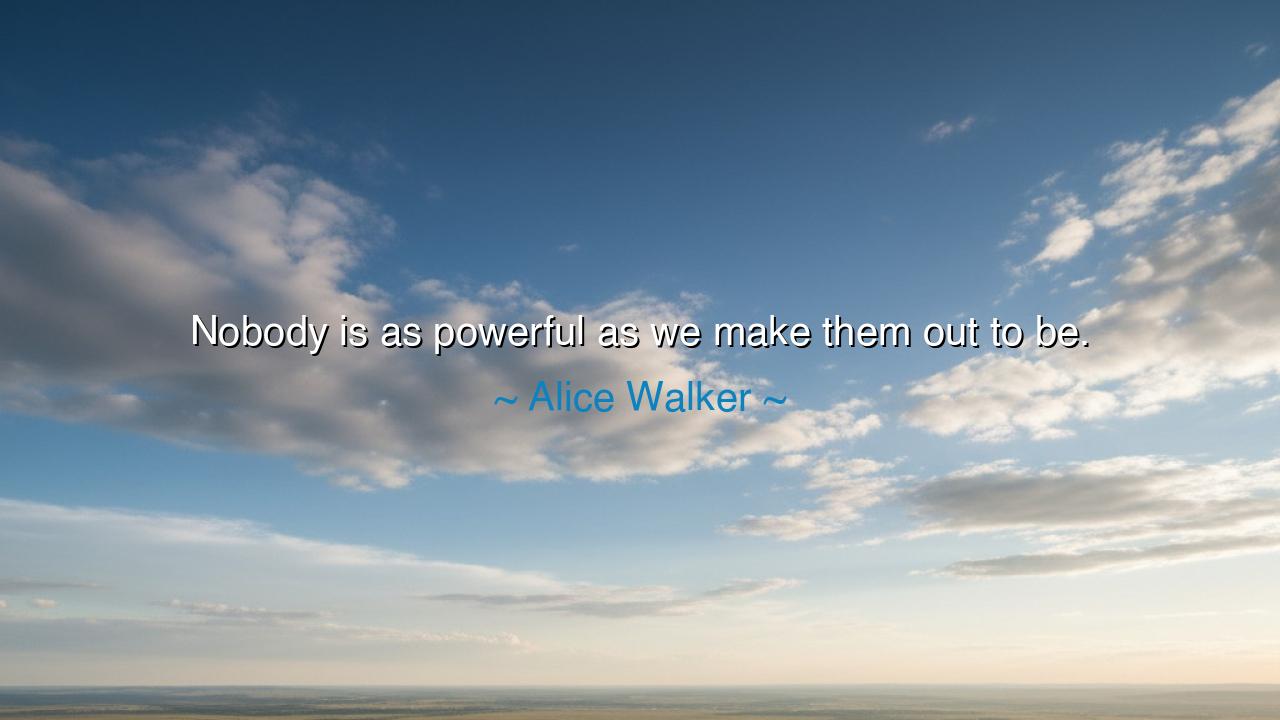
Nobody is as powerful as we make them out to be.






There is a great illusion that binds the hearts of humankind: the illusion of power. When Alice Walker, the wise voice of justice and human dignity, declared, “Nobody is as powerful as we make them out to be,” she revealed a truth both humbling and liberating. Those we fear, those we bow before, those whose names seem to shake the earth—they possess only the strength we collectively grant them. Power is not merely taken; it is given, often through the trembling hearts of those who believe themselves weak.
Power thrives on perception. A tyrant appears invincible not because of their own strength, but because the people believe they cannot be challenged. This belief becomes a chain, binding nations without a single sword being drawn. But when the veil is torn away and the people see their rulers as mere mortals, the mighty fall like crumbling statues. Thus, Walker’s words are a call to awaken from fear, to recognize that even the greatest throne rests on the fragile foundation of collective imagination.
History shines with examples of this truth. Consider the fall of the Berlin Wall in 1989. For decades, the rulers of East Germany seemed unshakable, upheld by walls, weapons, and secret police. Yet when ordinary citizens gathered with courage and unity, refusing to believe in their rulers’ absolute power, the regime collapsed without a great war. The wall, once a symbol of terror, was torn down by the very hands that had once trembled before it. In that moment, the people discovered that the tyrant’s might had always been a reflection of their own fear.
Even the mightiest empires have been brought low when the illusion of power fades. In ancient France, Louis XVI ruled as though ordained by heaven, his court glittering with wealth and pride. But when the common people of France saw through this illusion, realizing their collective strength, the French Revolution erupted. The king who once seemed untouchable was overthrown, proving Walker’s insight: power is never absolute, and those who seem godlike are often only men wearing crowns of borrowed belief.
Let this wisdom be carried to future generations: never place others upon pedestals so high that you forget your own strength. Power is a shared creation, a reflection of the hopes, fears, and choices of the many. When you cease to feed it with your obedience and awe, it withers like a plant denied sunlight. Remember always that even the greatest ruler, the wealthiest merchant, or the most feared oppressor is, at their core, only human. And when people unite in courage and truth, no throne, no crown, and no false idol can stand against them.






TTBui Thi Thuy Trang
This makes me reflect on personal and societal dynamics. It seems to suggest that empowerment and fear are socially constructed rather than inherent. I wonder how this insight could change the way people approach leadership, negotiation, or even bullying. Could shifting our perception reduce the dominance of certain individuals or systems? And conversely, could our collective overestimation of others be a mechanism that enables corruption and abuse of power?
ODOanh Duong
I find this perspective both liberating and unsettling. It implies that much of the authority we grant others is self-imposed, yet it also questions the real-world consequences of perceived power. How do we reconcile this with historical figures whose influence caused significant change or harm? Is power truly an illusion shaped by consensus, or are there limits to how much perception alone can amplify authority?
CLChau Linh
This quote raises questions about responsibility and agency. If nobody is inherently as powerful as we imagine, does that mean fear or reverence is misplaced? Could it be that empowerment is as much about the perceptions of others as the actions of the individual? I’m also interested in how this idea interacts with social movements: do collective beliefs about leaders amplify or diminish their actual effectiveness?
VANguyen Thi Van Anh
Reading this, I feel both relieved and challenged. It suggests that power is partially constructed by those who perceive it, which implies we have more control than we often realize. But if we overestimate others, does it mean we are complicit in our own subjugation? I’m curious whether Walker is advocating for a shift in mindset, and how one might practically resist inflating someone else’s influence in everyday life.
TNThao Nguyen
This statement makes me think deeply about perception versus reality in power dynamics. Are we giving leaders, celebrities, or authority figures more influence than they actually deserve? How much of their ‘power’ exists only in our collective imagination? I wonder whether this applies not only to politics but also to personal relationships and social hierarchies. Could recognizing this tendency change the way we respond to authority or resist manipulation?